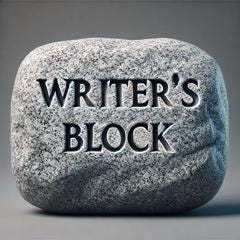Elizabeth: In the first installment of my story, I described how the initial draft of my memoir almost seemed to write itself. It flowed out in the most wonderful, cathartic rush, over just a few months.
However, when I sat down to edit, I found that I couldn’t; I just couldn’t. And this went on for weeks. I would sit down in the morning, pull up the first couple of pages on my computer screen, and…I could do nothing. Plus, the screen had a weird appearance: the words looked incised, as though they were carved in stone.
Barbara: You literally saw it that way?!
Elizabeth: Yes, literally. They looked incised. Each letter had a tiny shadow line from where it was “carved” into the screen. I would cut a sentence from here and haul it there. I’d try switching paragraphs. And at the end of the day, I’d move it all back. It was as though the words wanted to go back, as though I’d dragged them where they didn’t want to go. I couldn't make any headway at all. Zero. It was complete stasis — for weeks.
Barbara: The sentences were like a fixed entity that you couldn’t take apart and rearrange?
Elizabeth: Yes, but it was more that the words seemed impenetrable. I kept rereading the words I’d written, but I couldn’t quite grasp their meaning. It was like trying to write when you’re very tired. And you keep saying to yourself, “But what am I trying to say? What am I trying to say?” I couldn’t get a grip on what I was trying to say.
Barbara: First of all, one of the things that’s really clear is that you’ve just described how writer’s block feels, although yours was certainly an unusual manifestation.
As a writer, I know something of what you’re talking about. I certainly have had the experience of moving things around and then feeling like no, no, no. This isn’t right. And then by the time an hour has passed, I’ve put everything back to where it was beforehand. This happens when I haven’t been able to solve a particular problem with a manuscript—the organization of the piece, how to articulate an inchoate idea, how to simplify a complex concept, etc. But none of this is writer’s block! Writer’s block is being up against an internal obstacle into which you generally lack insight, it’s creative immobility that may go on for weeks, months, years. Something stops you in your tracks, like “hitting a brick wall” or a “stone wall”....
Elizabeth: What about the stone screen, do you have any idea of how that might have happened? Was it a hallucination?
Barbara: No. A hallucination is when you see something that isn’t there. This was an illusion. An illusion is when you see something that is actually there, but you see it in a distorted way. A common example is seeing a shadow and thinking it’s your dog who recently died, or hearing a sound and thinking it’s a voice, someone calling you. There were actually letters on your screen, but you perceived them in a distorted way.
And it was so symbolic: stone! Your thoughts were completely blocked, set in stone. It’s like a dream. A visual metaphor. It expressed the negative side of your conflict. One part of you wanted to write about the reality of your family, but another part wouldn’t let you do it. Something in your psyche – in your brain – stopped you. And it generated this distortion, which captured the experience of the stasis. You are a visual person, so your brain generated an image of what you were experiencing. Amazing!
Elizabeth: You’re saying the brain can create a dream-like illusion when you’re awake — all on its own, without a hallucinogen.
Barbara: Yes. For sure. Illusions and hallucinations, these certainly happen with drugs — and, of course, drugs work directly on the brain. Illusions and hallucinations can occur in all kinds of situations, including in medical conditions as common as migraines. These are not signs of psychosis unless the person thinks what they are seeing is real. Anyone can experience spontaneous illusions, and especially under extreme circumstances. And yours was an extreme circumstance.
Elizabeth: At the time, I didn’t think of it that way, at all. I was just sitting alone at the computer, stuck.
Barbara: Yeah, but look at what was really going on. You were trying to break out of a lifelong pattern!
Elizabeth: Now that we’ve talked about this, I can see that was true. Absolutely true. But, truly, until you and I started these conversations, that did not occur to me, let alone when it was happening. At the time, I was completely unaware of experiencing any emotional turmoil, of there being any conflict at all in what I was trying to do. I didn’t even realize that what I was experiencing was writer’s block! I couldn’t think. I was in a dense fog. And it never occurred to me that there was a reason for the fog. The stone screen was strange. But, believe me, how my writer’s block ended was much, much stranger.
Barbara: Well, let’s stop here. There’s a lot to unpack! Let’s talk next about what exactly writer’s block is.
If you are enjoying Two Friends Talk About Writing and the Brain, please share it with someone you think might enjoy it, too!






